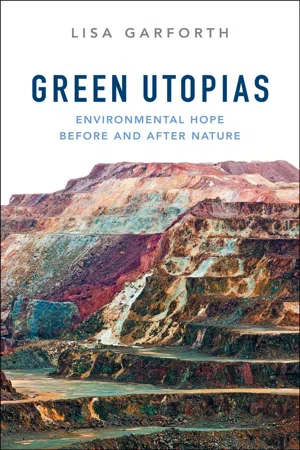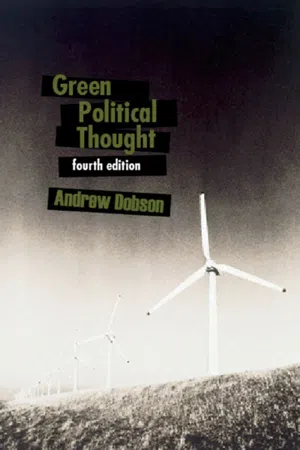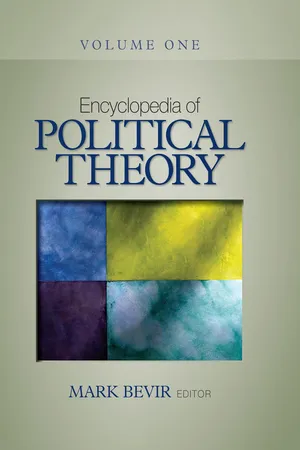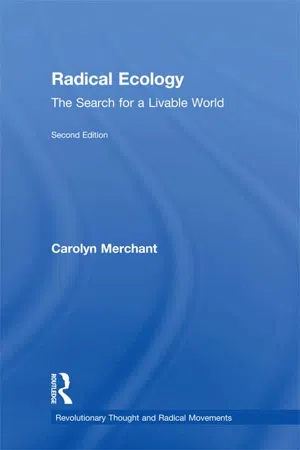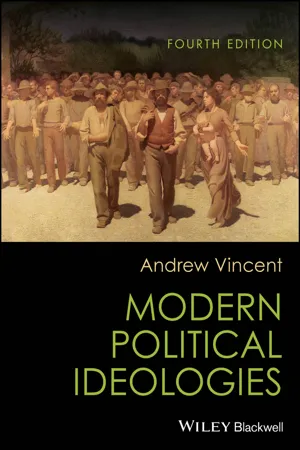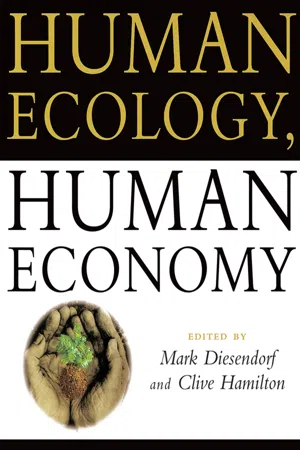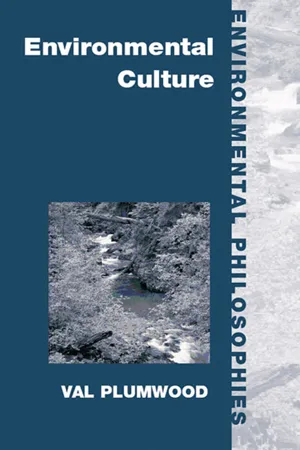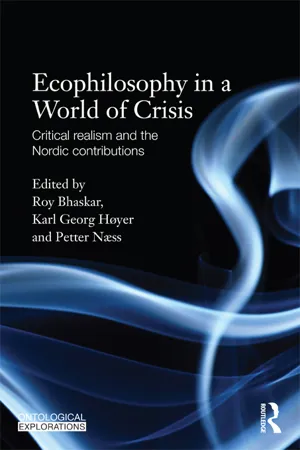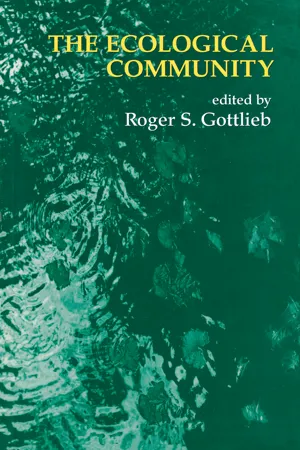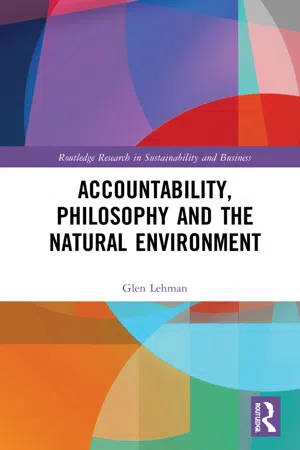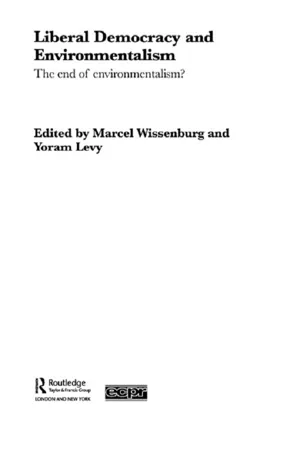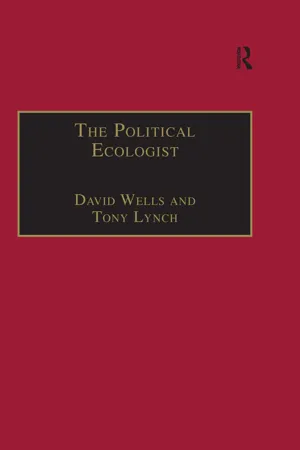Politics & International Relations
Deep Ecology
Deep Ecology is an environmental philosophy that emphasizes the intrinsic value of all living beings and their interconnectedness. It advocates for a radical shift in human consciousness and societal structures to promote ecological balance and sustainability. Deep ecologists argue for a reevaluation of human relationships with nature, advocating for a more harmonious and respectful coexistence with the natural world.
Written by Perlego with AI-assistance
Related key terms
12 Key excerpts on "Deep Ecology"
- eBook - ePub
Green Utopias
Environmental Hope Before and After Nature
- Lisa Garforth(Author)
- 2017(Publication Date)
- Polity(Publisher)
What links these approaches is an ecocentric ethic or an idea of biocentric egalitarianism. Attributing equal worth to nonhuman beings, suggesting they are not ultimately different in kind to humans, presents a severe challenge to Enlightenment humanism. Attributing value on the basis of interconnection and system, not on the basis of an individual entity, is even more challenging. Descartes cast the perceiving, knowing human subject as a rational mind separated from the material world (even to a certain extent from his own body). Ecocentric critics argue that this rationalist foundation for knowing the world marks the beginning of a fatal separation of humanity from the web of connections and relations of nature. It drew value into the sphere of human subjectivity and perception, treating the material world as having meaning and worth only in relation to human needs and desires. Many ecological philosophers argue that this attitude of human separateness is at the root of the environmental problematic. It founds a hierarchy of value with nature, instrumentalized, at the bottom. It legitimates the domination and exploitation of material resources and global ecosystems for human needs. In response, Deep Ecology presents a ‘comprehensive religious and philosophical worldview’ (Devall and Sessions 1985: 65) that expresses a deeply utopian desire for a complete alternative.Deep Ecology locates the source of socio-political change in the desiring subject. The only appropriate response to environmental crisis is to urge and imagine a radical transformation of culture and consciousness. This visionary and expressive utopianism separates Deep Ecology from other environmentalist discourses. Sustainable development approaches, as we have seen, emphasize continuities with existing values and structures and see the future in terms of incremental steps. Limits discourses argued for a break with current structures and practices, but their green futures started with the prospects for a rational reinvention of socio-economic systems. By rooting its model of change in the need for self-transformation and new metaphysical and spiritual paradigms, Deep Ecology (re-)connects environmentalism with Romantic and transcendentalist traditions. It changed the vocabulary through which green hopes were articulated. Rather than exploring specific environmental issues, criticizing contemporary economic systems, or proposing new social structures, it explores green desire in philosophical terms, speaking of and to matters of love, emancipation, being, nature and integrity. It imagines the ‘deep pleasure and satisfaction we [might] receive from close partnerships with other forms of life’ (Naess 1973: 96), rather than setting out abstract ethical imperatives.Deep Ecology makes green issues into personal concerns. It brings home the need for transformation, and locates the most important step in individual consciousness. It suggests that everyone can open their eyes to a new world, identify and express empathetic feelings for the nonhuman other, and act in accordance with these feelings. The personal, desiring and metaphysical character of Deep Ecology is, I suggest, its most utopian aspect. But this is not a practical utopianism, nor does it produce descriptive images of alternative futures. Its language of metaphysics and intuitive ethical commitments can feel removed from everyday life. Deep ecological discourse can often seem romantic and self-absorbed. It has much to say about a ‘meditative dancing in the wonder of the cosmos’ (Devall and Sessions 1985: 114), but less to say about who puts the recycling out or how different kinds of people might experience being in touch with nature. For some deep ecologists, pure nature, and wilderness in particular, take on a kind of mystical power over human agency, and lessons from nature are privileged over social choices. But there is a pragmatic and political dimension to deep ecological vision, not just a romantic and desiring utopianism, which we explore in the next section. - eBook - ePub
- Andrew Dobson(Author)
- 2007(Publication Date)
- Routledge(Publisher)
Some years ago, ‘Deep Ecology’ was regarded as a keystone of radical political-ecological thinking (Curry, 2006, pp. 71–81). It was believed that a fundamental ethical shift was required that would dethrone human interests as the centrepiece of political life and extend ethical concern deep into the natural world. In recent years, this ethical move has itself been decentred in favour of a more political response which calls for an extension of political voice that would include nature. What these two moves have in common is a questioning of the overriding centrality – the ‘trumping’ effect – of human interests over those of other parts of the natural world. I shall say more about the democratizing move later in this chapter but the ethical arguments that paved the way for it are critical and I shall deal with them now.The first influential use of the term ‘Deep Ecology’ is generally credited to the Norwegian Arne Naess. In September 1972 Naess gave a lecture in Bucharest in which he drew a distinction between what he called the ‘shallow’ and the ‘deep’ ecology movements. The distinction had to do with the difference between a shallow concern at ‘pollution and resource depletion’, for the damaging effects this might have on human life, and the deep concern – for its own sake – for ecological principles such as complexity, diversity and symbiosis (Naess, 1973, p. 95). I suggest that Deep Ecology informs a certain type of radical green politics in a way that will not be obvious to those who make such politics synonymous with environmentalism. Indeed, ecologism’s being informed by Deep Ecology is precisely what (partly) helps distinguish it from environmentalism: environmentalists will be happy with so-called ‘shallow’ ecological reasons for care for the environment, while deep ecologists will want to advance ‘deeper’ reasons which take the natural world as an entity worthy of moral concern in its own right. - eBook - ePub
- Mark Bevir(Author)
- 2010(Publication Date)
- SAGE Publications, Inc(Publisher)
The first wave of green political theory that followed from these early texts can be divided into its philosophical and political dimensions and, in terms of the latter, between those who sought to bolster the role of the state, at least in the short term, to deal with environmental problems and those who sought the deindustrialization of contemporary society and the decentralization of political power. Philosophically, there are two related areas of importance: metaphysics, on the one hand, and axiology, or value theory, on the other. Some green thinkers sought what they saw as fundamental metaphysical and axiological change, challenging the entire basis of the dominant tradition of Western political thought. This ambition is closely associated with Deep Ecology, a doctrine given its most explicit outline by the Norwegian philosopher Arne Naess. For Naess, the deep/shallow ecology distinction tracked, roughly, the distinction noted above between ecological and environmental ends. Shallow ecologists seek piecemeal solutions to environmental problems and do not question the underlying economic and political order or the values on which that order is itself based. Deep Ecology, on the other hand, is held to be radical in the sense that it seeks to get to the roots of these environmental problems and treat their causes rather than just the symptoms. Deep ecologists seek to foster an ecological worldview in which human beings would see themselves as just one part of a web of life on Earth, through which any action on our part as human beings would have multiple, indeterminate, and unpredictable effects elsewhere. The warrant for this worldview was allegedly provided by the science of ecology, which deep ecologists took to overturn previously dominant Newtonian scientific frames, which saw matter as featureless and above all separable, for the purposes of analysis, into its smallest constituent components. The holistic science of ecology thus presented a fundamental challenge to the atomistic sciences, such as physics. As with many political theories, there was here an appeal to science to provide an empirical foundation for the underlying view of the world, and like many scientific perspectives employed in the political realm, it was a partial interpretation—of both ecology and Newtonian physics. As historians of scientific ecology have pointed out, there is a holistic strain to ecology, which, for example, sees ecosystems as having supervenient properties that are more than the sum of their parts, but there is also a more conventionally analytical scientific frame employed in ecology, and the latter is currently dominant. - eBook - ePub
Radical Ecology
The Search for a Livable World
- Carolyn Merchant(Author)
- 2012(Publication Date)
- Routledge(Publisher)
4 Deep Ecology
DOI: 10.4324/9780203084212-4Deep ecologists call for a new ecological paradigm that will replace the dominant mechanistic paradigm of the past three hundred years. This new worldview would represent as profound a transformation as the one which occurred during the scientific revolution of the seventeenth century. It would be so fundamental that it would entail new metaphysical, epistemological, religious, psychological, sociopolitical, and ethical principles. Taking its name and approach from Norwegian philosopher Arne Naess’ conference paper presented in Bucharest in 1972 and published in 1973 as “The Shallow and the Deep, Long-Range Ecology Movement,” Deep Ecology holds that the reform environmentalism of the 1970s and 1980s dealt only with legal and institutional fixes for pollution and resource depletion, rather than fundamental changes in human relations with nonhuman nature (see Table 4.1 ). When in 1986 sociologist Bill Devall and philosopher George Sessions published a book, and writer Michael Tobias published a collection of articles on the topic, Deep Ecology gained visibility beyond the community of philosophers. It has now become the legitimating framework for an array of ecological movements from spiritual Greens to radical Earth First!ers.1A dominant social paradigm, according to Devall who elaborated on Naess's approach, is a “mental image of social reality that guides expectations in a society.”2 Deep Ecology challenges the dominant western paradigm elaborated in Chapter 2 . It calls for a new ontology (science of being), a new epistemology (way of knowing), a new psychology (idea of self), and a new metaphysics (assumptions about the world). It offers a new science of nature, a new spiritual paradigm, and a new ecological ethic. Deep ecological thinking emerges from the sense of ecological crisis detailed in Chapter 1 - eBook - ePub
- Andrew Vincent(Author)
- 2023(Publication Date)
- Wiley-Blackwell(Publisher)
1990 ). On the other hand, intrinsic value theory can be used within anthropocentric ethics to speak of the intrinsic value of human persons as distinct from nature. Its most prevalent use is in the various elements of the intermediate eco‐philosophical position, in very different formats, in the work of philosophers such as Holmes Rolston III and Robin Attfield, amongst others.The question of the classificatory relation between the above philosophical views and the spectrum of political opinions must now be briefly explored. The same broad groupings can be identified as in the philosophical typology. One point that should be mentioned is that the political format in which these groups appear veers across pressure groups to political parties. There is no precise one‐to‐one correlation between any of these philosophical categories and political forms. Deep ecologists are therefore just as likely to be in parties or pressure groups. Thus, on the one hand, there is a ‘light’, more reformist wing within ecology. This wing is often divorced from the ecology perspective altogether (see Bookchin 1986b , 27). Within this category, we find some of the most traditional environmental groups: for example, conservation groups, preservation, single‐issue and recreation groups. In fact, the large bulk of politically successful environmental groups tend to function in this category. Their major appeal is most usually premised on the importance of valuing and retaining some aspect of the environment for the benefit or survival of human beings. In other words, what underpins their appeal is the human prudential anthropocentric arguments. The reformist wing essentially works within existing institutional frameworks and political processes, although its members might resort to some form of public demonstration to make a point.At the other extreme is the Deep Ecology wing. Its appeal is to the Arcadian mentality, as Donald Worster calls it (Worster 1977 ). Deep ecologists usually want a total value‐change in society – where the whole perception of the world and nature changes. In this sense there are a number of what have been called ‘ecotopias’ lurking in the wings. As argued in the philosophical typology above, there are a variety of tendencies here. There are those who believe in setting up alternative communities based on religious or secular principles and utilizing alternative technologies. They have a very distinctive social philosophy premised on concepts such as ‘bioregionalism’, which we will come to. This area has also attracted support from a group of eco‐feminists who see the Deep Ecology society as the most likely to realize non‐patriarchy.24 More controversially there is a somewhat forgotten nationalist and völkisch component which attracted enthusiasts earlier in the century. Haeckel’s philosophical monism (and those who utilized variants of it) conforms more closely to the deep model. The arguments of traditionalist conservatism, fascism and national socialism concerning the attachment of humans to land and place resonate within this perspective.25 - eBook - ePub
- Clive Hamilton(Author)
- 2020(Publication Date)
- Routledge(Publisher)
Based on a more relational, gender-balanced view of humanity, environmental philosophers and activists argue that resolving the environmental crisis is not just a question of instilling more ecological awareness, but of challenging the most basic assumptions we have about the natural world and ourselves. The theories, policies and behaviours that follow from a conception of the self as a social being and an integral part of the natural world which is intrinsically valuable, are very different from those that flow from the radical individualism of modern economics.Deep Ecology argues that anthropocentrism has led to our alienation from nature and calls for personal transformation through cultivation of an ecocentric perspective. Ecofeminism points to the fundamental structures of Western cosmology and the deep-rooted dualisms in the Western perception of reality. These dualisms are gendered and limit our appreciation of the human need for community and nature. The patriarchal association of women and nature has meant the devaluation of both, and this view underpins not only our institutions but most academic fields of study.The philosophical divide extends to notions of justice and inter-generational equity. Economics emphasises procedural rules for judging the ethical implications of income and resource distribution. Ecophilosophers emphasise outcomes both for humans—broadly defined to include aspects of well-being such as empowerment and self-realisation—and for the intrinsic value of nature. They call for new institutions, economic systems and decision-making methods which coincide with the new understanding of our place in the world. - eBook - ePub
Environmental Culture
The Ecological Crisis of Reason
- Val Plumwood(Author)
- 2005(Publication Date)
- Routledge(Publisher)
17 , clear that the theory of Deep Ecology has not succeeded in eliminating ethics, but rather in disguising its ethical assumptions as psychological assumptions. The ethics of solidarity provides an alternative basis for many deep ecological insights which avoids the implicit positivism of the ‘no-ethics’ approach, enables the development of stronger connections to human liberation movements, and avoids the many difficulties of the unity interpretation.Unity and the political theory of Deep Ecology
In the area of political theory similarly, Deep Ecology has the possibility of different routes of development which are allied with divergent political choices. Again, it is in part a question of deciding whose company you want to keep – a choice which Deep Ecology cannot now say ‘pass’ to as it did in the early days, especially as questions of political organisation have come so much to the fore in contemporary discussion in environmental theory. Since virtually every political position now claims to be green, (or has a green-dyed form, sometimes where the dye will clearly come out in the first wash), the question can’t be declined via some version of a Principle of Tolerance, which is the way Naess’s work suggests for dealing with it, or by appeal to individual consciousness change. Deep Ecology’s political thinking in response to this problem has so far been strikingly shallow: initially it employed the concept of unity between person–place and person–community to embrace bioregionalism and small-scale communitarianism, without any clear indication (beyond individual consciousness change) of how this was to be achieved or what political structure would maintain it or guarantee its ecological character. This early fantasy phase of unity has now been succeeded by theoretical developments I discuss below – also based on unity – that are more explicitly accommodating to existing power structures. - eBook - ePub
Ecophilosophy in a World of Crisis
Critical realism and the Nordic Contributions
- Roy Bhaskar, Petter Naess, Karl Høyer(Authors)
- 2011(Publication Date)
- Routledge(Publisher)
In short, environmental education campaigns can fortunately combine humancentred arguments with a practical environmental ethic based on either a deeper and more fundamental philosophic or religious perspective, and on a set of norms resting on intrinsic values. But the inherent strength of this overall position will be lost if those who work professionally on environmental problems do not freely give testimony to fundamental norms …3. What is Deep Ecology?
The phrase ‘Deep Ecology movement’ has been used up to this point without trying to define it. In what follows, a set of principles or key terms and phrases (or a platform), agreed upon by George Sessions and myself, are tentatively proposed as basic to Deep Ecology.2 More accurately, the sentences have a double function. They are meant to express important points which the great majority of supporters accept, implicitly or explicitly, at a high level of generality. Furthermore, they express a proposal to the effect that those who solidly reject one or more of these points should not be viewed as supporters of Deep Ecology. This might result because they are supporters of a shallow (or reform) environmental movement or rather they may simply dislike one or more of the eight points for semantical or other reasons. But they may well accept a different set of points which, to me, has roughly the same meaning, in which case I shall call them supporters of the Deep Ecology movement, but add that they think they disagree (maybe Henryk Skolimowski is an example of the latter). The eight points are:- The well-being and flourishing of human and non-human Life on Earth have value in themselves (synonyms: intrinsic value, inherent worth). These values are independent of the usefulness of the non-human world for human purposes.
- Richness and diversity of life forms contribute to the realization of these values and are also values in themselves.
- Humans have no right to reduce this richness and diversity except to satisfy vital needs.
- The flourishing of human life and cultures is compatible with a substantially smaller human population. The flourishing of non-human life requires
- eBook - ePub
- Roger S. Gottlieb(Author)
- 2014(Publication Date)
- Routledge(Publisher)
This paper holds both sides to be more wrong than right. Ecocentric ethics need not be as alien to liberal principles as they often seem. In fact, that liberal tradition beginning in the eighteenth-century Scottish Enlightenment is unusually hospitable to ecocentric insights. The work of David Hume and Adam Smith, and their contemporary heirs F. A. Hayek and Michael Polanyi, offers an important link between modern and ecocentric thought. Understanding this link offers an opportunity more deeply to ground the foundations of western modernity, and in doing so harmonize them with the world of nature.What is “Deep Ecology”?
"Deep Ecology" is a term coined by Norwegian philosopher Arne Naess. Its general perspective also applies to other environmental thinkers who broadly share Naess's view of humanity's proper relationship with the nonhuman world, although arriving there by different ways. Deep ecological perspectives have also been described variously as "biocentric," "eco centric," or "transpersonal." All contrast themselves to "anthropocentric" points of view.3"Anthropocentric," or human-centered, ethics argues that value in the natural world originates in the attitudes human beings take toward nature. Trees, waterfalls, and butterflies alike possess no moral standing beyond their capacity to serve human ends, or perhaps as repositories of values important to humans. In themselves, they have no meaning or ethically significant value.Most anthropocentric views regard the non human world in instrumental terms. Eugene Hargrove argues that this need not follow, and that deeming a belief anthropocentric simply "refers to a human-oriented perspective, seen from the standpoint of a human being."4 - Glen Lehman(Author)
- 2021(Publication Date)
- Routledge(Publisher)
One perspective: If through our mediational view of the world we believe that we can mirror the firm foundations of the way the world really is then we have nothing to worry about. However, if one can see the world as it is, then this is not itself a solution because merely seeing something as it does not solve the problem if we are not acting in accordance with that. And, if we cannot see it, does it matter what we do? If we act as if Nature has intrinsic value, then that has certain obligations implicit with it. If we act as if Nature has no intrinsic value, and we then destroy it, we later discover we were wrong, but it is then too late to do anything about it.Ecological politics and moral theory
Exploring different environmental positions draws attention to the need to consider proposals for humanity to restructure its basic institutions to realise environmental values. In particular, social ecology and deep/Deep Ecology are limited in that they do not provide sufficient analyses of the social conditions limiting the effectiveness of our basic institutions of governance. The inter-relationships between humanity and Nature must be considered in conjunction with the social causes that give rise to social problems. In sum, social and Deep Ecology fail to recognise the aesthetic dimensions that Taylor refers to as the awe of Nature. Complex intrinsic-based arguments, constructed at a meta-theoretical level, can obfuscate real-world dilemmas. Here, Matthews seems to accept the thrust of what Young calls a ‘stopping point’ approach, offers some hope (see Chapter 1 of this book).While metaphors such as ‘space-ship earth’ are advanced to ‘think global/act local’ or to respect Nature’s intrinsic value can be avoided when we consider the type of community in which we want to live. Thinking about how we live and act in the world involves many things, not the least is an awareness of the processes of global capitalism. Arguably, interpretivism thinking invites us to keep in mind those factors that involve the construction of new political arrangements where Nature’s non-instrumental good is expressed (Lehman, 2010a, 2010b, 2011a, 2011b- eBook - ePub
Liberal Democracy and Environmentalism
The End of Environmentalism?
- Yoram Levy, Marcel Wissenburg(Authors)
- 2004(Publication Date)
- Routledge(Publisher)
Within all our titles, then, there is a more or less explicit model of how the levels of institutional structure might link together and how they should affect broader cultural change. Such a model tends to look like this — that we create new institutional provisions to promote both environmental well-being (rights, constitutional reform, economic management, educational provision and so on) and to frame subsequent debates (Hayward 1998: 152–6; J. Barry 1999a: 210; de-Shalit 2000: 172–213); that we then construct deliberative fora in which we may publicly discuss what our broader interests are and develop some collective sense of the good (Hayward 1998: 100; J. Barry 1999a: 252; de-Shalit 2000: 134); this in turn will provide part, though not all, of the impetus necessary to create, variously, a sense of community (de-Shalit 2000: 109); a sense of solidarity (Hayward 1998: 77); or a sense of green citizenship (J. Barry 1999a: 226–36).The current work we have considered, then, appear to approach ‘endism’ in two of the ways outlined in the Introduction to this volume. In the first place, they are looking (as does much other work in green political theory) to safeguard the green perspective from the damaging challenges of liberals, particularly concerning the ambivalent attitude of some greens to democracy and personal choice (see Humphrey, in this volume, for a detailed account of some of the problems here). On the other hand, there is an explicit critique of Deep Ecology, its account of human-nature relations and, as a consequence, its political and ethical form. Of course, the veracity of this critique rests to a large extent upon its ability to present a model which can, indeed, avoid the problems it identifies in Deep Ecology. It is to this we now turn.The problem of metaphysicsDeep Ecology, it has been argued, posits a metaphysical view of the relations between humans and their environment in which these relations may be harmonized largely through a deliberate transformation of personal consciousness based upon personal experience of nature. In turn, this experience will prompt or reawaken an intuitive sense of right and wrong, good and bad, and so provides the basis for a new ethic. - eBook - ePub
- David Wells, Tony Lynch(Authors)
- 2017(Publication Date)
- Routledge(Publisher)
Once we recognise that human communities always exist within broader ecological communities, and that the welfare of those communities are intimately connected to each other, then the way forward might be a little clearer. What is immediately apparent from our experience of environmental degradation is that a longer-term perspective in human affairs is required. In so many cases, short-term economic and other gains have been pursued at the expense of long-term environmental losses, and losses which ultimately might prove to over-shadow such gains: the search for one kind of welfare has endangered another. If today we claim to be humanists, it is equally true we have a bad conscience about our relation to those yet to come, or whose going will be long after ours. Often we use our economistic obsessions to hide, even rationalise, this uncomfortable selfishness. It is in its recognition of the overwhelming importance of such long-term considerations in the search for a better life that the green movement presents such a fundamental challenge to existing political and economic beliefs and programs. But if that challenge loses its sense that the primary aim is still human welfare then it also loses much of its force. Notes 1 Lyn White Jnr., "The Historic Roots of the Ecological Crisis", in J. Barr (ed.), The Environmental Handbook, (London: Ballantine/Friends of the Earth, 1971), pp. 3-16. The following quotations are from this article. 2 Arne Naess, "The Shallow and the Deep, Long-Range Ecology Movement", Inquiry, 16. 3 William Grey, "Anthropocentrism and Deep Ecology", Australasian Journal of Philosophy, 1993, Vol. 71, No.4, p. 463. 4 M. Bookchin, "Social Ecology Versus Deep Ecology", Socialist Review, 1988, 18 (3), p. 18. The following quatations are from this article. 5 W. Fox, "The Deep Ecology-Ecofeminism Debate and its Parallels", Environmental Ethics, 1989, Vol. 11 (Spring), p. 16 6 Robyn Eckersley, Environmentalism and Political Theory, (London: UCL Press, 1994)
Index pages curate the most relevant extracts from our library of academic textbooks. They’ve been created using an in-house natural language model (NLM), each adding context and meaning to key research topics.
